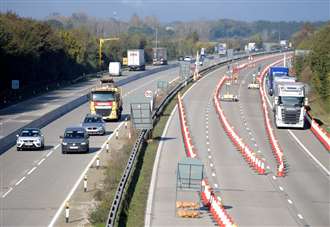The dreaded Operation Brock contraflow is to be deployed on the M20 ahead of the summer holidays.
The motorway will be closed between Ashford and Maidstone overnight next Wednesday (July 16) so the system can be deployed on the following day.

Kent and Medway Resilience Forum (KMRF) has called for its launch between Junctions 9 and 8 London-bound and Junctions 7 and 9 coastbound due to the high passenger numbers expected at Kent ports.
The system is being deployed on a 13-mile section in a bid to improve traffic flow.
Bosses say data from the Port of Dover and Eurotunnel shows high volumes of passenger traffic are expected each weekend during July, with KCC schools finishing the school year on July 22.
A formal review of whether the barrier needs to stay out will take place in the first week of August.
KMRF’s strategic lead for border disruption, Simon Jones, said: “The decision to put the Op Brock barrier out is made to keep disruption for Kent residents to a minimum and always led by the number of passenger and freight crossings expected at the Port of Dover and Eurotunnel.

“Our work with central government to identify a better traffic management solution will continue, alongside our around-the-clock traffic monitoring so everyone can get to where they need to be safely this summer.”
Fully signed diversion routes will be in place while it is closed.
Should traffic start to build at the Port of Dover or Eurotunnel, KMRF is advising drivers to check their route before setting off, allow extra time for the journey and pack the car with essentials including food, water and medication.
Operation Brock creates a dedicated lane for HGVs to queue, if needed, between Junctions 8 and Junction 9 of the M20.
Lorries heading to the continent queue on the coastbound side, with the London-bound carriageway operating as a contraflow with narrow lanes and a 50mph limit.
When the M20 reopens, the Brock contraflow will be active and all signs should be followed.

Once the barrier is in place, all HGVs heading for the Port of Dover or Eurotunnel must follow the signs to join Operation Brock at M20 Junction 8.
All other coastbound traffic – including local freight and car drivers heading for the continent – should follow the signs and cross over to enter the contraflow on the M20 London-bound carriageway.
But the system has been described as a “massive inconvenience” for residents, and Kent MPs have questioned whether it is necessary to put it in place during every school holiday.
In January, it was revealed the government is working on a permanent solution to the problem of congestion at the Port of Dover backing up traffic deep into Kent.
The new system would use a combination of new digital technology and off-road sites to hold HGVs during disruption, but is still in the early planning stages.
Bosses say the decision to use the traffic management measure is made collectively by KMRF, a partnership of agencies including Kent Police, Kent County Council and National Highways.
KentOnline also revealed last month how the Brock contraflow costs taxpayers hundreds of thousands of pounds every time it is used.
Deploying and removing the traffic management system on the busy motorway racks up a bill of about £250,000 each time, while maintaining and servicing it adds up to a further £100,000 per week.
